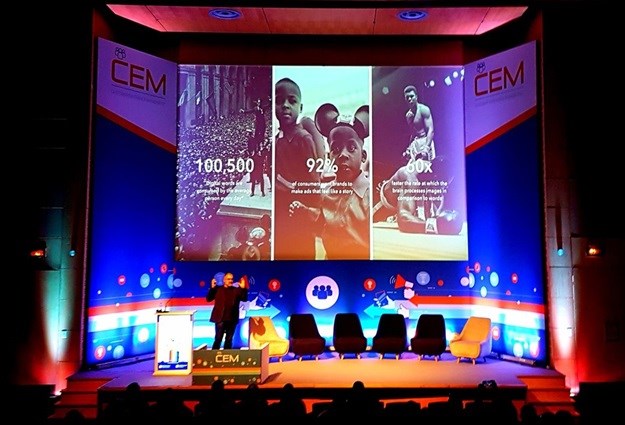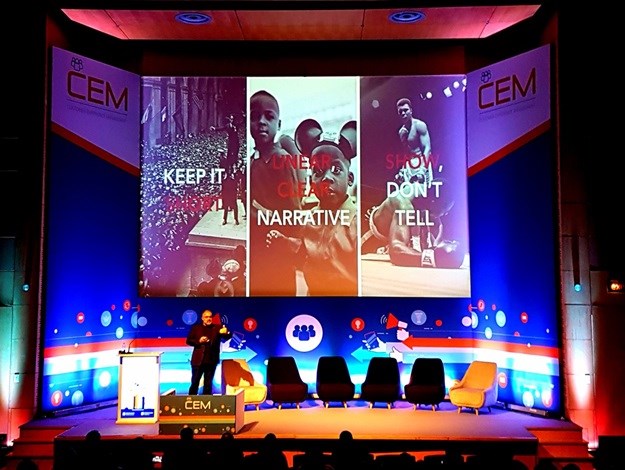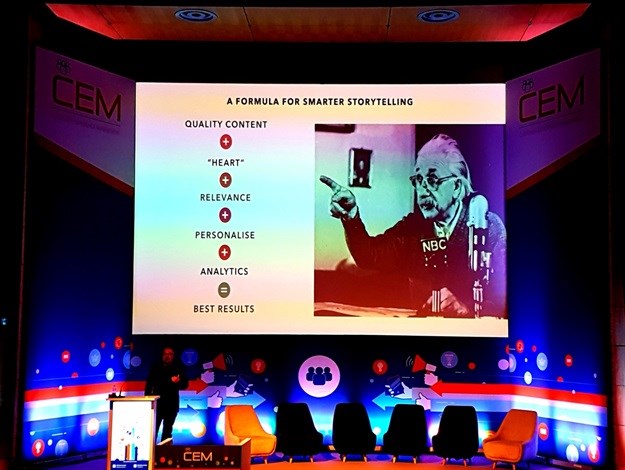Joubert certainly knows his stuff and has a way of sharing stories himself that make you wish you were really huddled around a campfire with him, mugs of hot chocolate and marshmallows at hand with an endless, night-dreamy sky above.I wish I founded Billabong :) #TheBillyboGroup https://t.co/H8kSdRxlYz
— mike joubert (@brandsrock) August 1, 2018
MC Leeanda Reddy herself said in introducing Joubert that he inspires her to "...wear those ripped jeans and drink that brandy. Never stop learning and you will own the market." Nuff said.
On the topic of emotional storytelling, which Joubert admits is an overused concept in marketing today, he said the relevance to customer experience or CX lies in the emotions you evoke in telling those stories.
But not one to flog a dead horse, Joubert had looked through the list of attendees as was satisfied that we already understand the basics.
So instead of trying to convince us of the power of storytelling, he instead aimed to inspire us to be great at emotional storytelling, having himself stood in the shadows of marketing storytellers for decades, with reams of tales to share.
First up was an example of just 60 seconds in the art of telling good stories, through the Guinness 'here's to waiting' video.
Joubert said, "Not too shabby for a product born in 1759 in Dublin." He explained that over the course of both world wars, Guinness had been advertised as a drink that was good for you; it was 'healthy for men who worked too hard'.
Fast forward to 2009 when this short film was created, and today's woke consumers may well ask, "What does it have to do with drinking a Guinness?" To which Joubert responds it's actually everything about how people consume brands.
Just think of shopping behaviour, which is the research and interest evoked before you visit the store, as opposed to purchasing behaviour, which is when you’re in that transaction space.
Joubert says the emotion required for both is different, but the underlying theme is the same - you need to feel good to make that purchase, hence the importance of emotion in customer experience.
Next, Joubert shared examples of brands on social media. Two recent posts by the big four banks explained their support of local sport and the reasoning for their rebrand. But customers don't comment in that.
Instead, they share their poor experience with the brands for all to see. The nub of this story is that brands don’t go out of their way to upset consumers, it's more the case that consumers expect more today from brands than ever before.
That's why Joubert says to put yourself in your target audience's shoes. It starts with you, so test those big, 'brave' ideas on yourself first.
We used to do business in a push economy, but today, it’s all about the pull. And that pull economy started with the first ever televised piece of advertising content for Bulova, which simply stated: "America runs on Bulova time."
The ad itself took just ten seconds, and the rest is history.
Honing in on the fact that we now live in a pull economy, Joubert said the knowledge economy is undoubtedly the biggest economy in the world.
We use Google and Wikipedia to hunt down information, even with fake news constantly looming on the horizon, but Joubert says not to underestimate how intelligent we all are in navigating fake news.
The end result of this? We, the people, make the final decision, as much as marketers try and influence us as consumers.
With the ever-shortening attention span and rise of attention spam, we need to make sure our spheres of intelligence includes people who challenge us to be our most creative, as we have just eight seconds to make that convincing and compelling argument before we lose those consumers to the next flashing screen.
As a caveat, Joubert pointed out that consumers "don’t speak boardroom," so we need to change the way we make those arguments.
People don’t consume advertising, but rather what informs, educates, educates and empowers them.Joubert showed a clip of the ultimate 'Mad Man' Don Draper, who said advertising is all about the new, in creating a product to soothe the itch of a problem, but not to discount the potency of nostalgia in your storytelling, because when we watch something on screen, we tend to put ourselves in the characters’ shoes.


Joubert said to show not tell, as consumers' intelligence is vastly underrated.
Life is tough; wouldn’t it be sad if we didn’t believe the message we convey could break through and give that spark of hope? Deliver the message as a story.For example...
In conclusion, Joubert said not to focus on 'millennials' as they're simply the young people of today, looking to be entertained

Run with that. You can read up on more on #CEMAfrica, and watch for our coverage of the two-day conference.
